“To get even near humility, even for a moment, is like a drink of cold water to a man in the desert.” –C.S. Lewis
I always thought epiphanies happened in scenic settings: a snowy mountaintop, the South Pacific Ocean, or the Australian Outback at sunset. Mine came at a quilt show. My revelation happened on our last group ride when I overheard a comment made by Terry Hammond, the unquestioned leader of the Mild Hogs.
“You know, real men would be at the rodeo,” he said. Terry was being facetious because of course, we were at a quilt show.
“This is why we ride,” he said. “This is pure Americana.”
The quilt show we were attending was a fundraiser for the High Plains Fire Department. All of the quilts were donated by an elderly, stage 4 cancer patient seated in the far corner of the room, surrounded by smiling family and friends. Her decades of work hung around the grange hall like a timeline of her life. Which it was.
Instantly I realized where my years of writing had gone astray. I had been writing about our bikes, our roads and ourselves, an ego-centric point of view. Years were wasted missing my real mission: uncover the personal relationships that make this country unique in world history, the American ideals of love and sacrifice for the good of others, whether family, friend or stranger.
Terry was right. Men were at the rodeo taming beasts whose aim was to toss their riders into the dirt and trample them. But men who put others first, who loved their community, who sacrificed themselves for the good of others were attending the quilt show. It was a potluck also, so that helped.
I had a new mission. My crusade was to seek the American ideal of love for our fellow countrymen everywhere I rode. The quest took me three weeks, covered eight states and over 4,000 miles. What I found brought joy, pain, and changed how I ride and write forever. All because of a quilt show in the small hamlet of High Plains.
High Plains lies in a steep valley in southern Washington State, homes widely spaced, hidden in the rising mountain walls and thick pine forests. It is likely the entire town attended the quilt show, and all of them could have squeezed into a school bus. Yet, they welcomed strangers like us into their family, even though we had known them for only a few hours and would be gone by morning.
The quilts sold well, a volunteer firefighter gave a tender speech and the Bluegrass Band in the corner covered Psycho Killer by The Talking Heads, earning a standing ovation from everyone under the age of 50. Both of us. Yet, I could not stop thinking about the love it took for the elderly woman to give her life’s work as a gift to a volunteer organization. Also, I could not decide which took more love and sacrifice; giving away a lifetime’s collection of 70 quilts or being a volunteer firefighter in a town nestled into the woods in a fire-prone northwest. Both laid down their life for their neighbors. Nothing is more American.
I could have been on the motorcycle scraping my foot pegs on our secret roads or at the rodeo watching men beat their chest at their beastly conquests. However, neither act has a lasting impact. Their memory and accolades fade as soon as the next corner or contestant. What permanently changes the course of lives (and nations) is a sacrifice, not show. I wondered if this trait existed only in small towns where interdependence is a survival trait. Would I find it elsewhere? I would soon find out.
Laguna Seca Volunteer
Days after leaving High Plains, I arrived at Laguna Seca Raceway in Salinas, California for the American round of the World Superbike races. Different arena, same rodeo. But with 230 horsepower, instead of one.
As I sat working security at Laguna Seca’s start-finish line, I could see the bikes flash by at over 150 mph. They wiggled and flexed as their riders slid off the left side of the seat, forcing their bikes to turn when all the laws of physics were telling the bikes to go straight, directly into the gravel. I am not sure who had a harder job controlling their steeds: the High Plains cowboys or Laguna Seca riders. Both of their mounts could maim or end lives without warning. The race was a spectacle worth watching, especially because there was no quilt show or potluck nearby.
Then I remembered my quest. It was not about the roads. Or in this case, the track. It was about my search for American love and sacrifice for others. Which is why I turned my back to the asphalt rodeo and talked to the elderly man seated to my left.
His name was Chuck Baird, and he has been at Laguna Seca since its opening in 1957. From that time until now, he has missed one race. One. This fact is even more stunning since Chuck is not a Laguna Seca employee, he is a volunteer.
Laguna Seca stands out among the high profile racetracks of the world because it is run by volunteers. The paddock crew gives their time freely to a track that draws racers and machines from around the globe. Yet it is run by local volunteers who do it for the love of racing, the track and each other. The list of special people at the track is long, but no one has been there longer than Chuck Baird.
Chuck’s elderly frame is short and he walks, sometimes unsteadily, with a cane in each hand. He wears two hats, a baseball hat with the track logo perched on top of his second hat, a wide-brimmed straw hat to shield the sun. He has a long beard like an old west gold miner and a soft voice that speaks with the innocence and enthusiasm of a young boy.
When he speaks, I listen. What Chuck has witnessed in over 50 years of volunteering at Laguna Seca is worthy of its own book. One day, if I have lived life right and the stars align, I would be honored to write that book. If I did, it would have Chuck’s stories about people from the golden age of racing: James Dean, Steve McQueen, Sterling Moss, Phil Hill, Freddie Spencer, John Cannon, Clessie Cummings, Mrs. Colin Chapman, and Dan Gurney to start. When I asked Chuck about writing his history, his reply was “If I empty it all out, I will have nothing to talk about. No one will want to listen to my stories anymore.”
I doubt it. Nevertheless, I honored Chuck’s request to not write about his stories. Because I promised. And in America, our word is bond.
Chuck & Big Daddy
Maybe just one.
His favorite story happened that summer and involved drag racer “Big Daddy” Don Garlits. When I asked about this recent encounter, Chuck’s eyes sparkled and he got as excited as a Boy Scout earning a merit badge.
“He put his arm around me” Chuck declared, “and I thought to myself, ‘Oh boy! Don Garlits has his arm around me!’”
He showed me the picture. It’s heartwarming. Don Garlits has his right arm around Chuck and although Don is giving a beaming smile for the camera, like the pure southern gentleman he is, Chuck is not. Chuck is not even looking at the camera. He is looking up and to his left at Don Garlits in admiration, like a child meeting his hero. Chuck’s ear to ear grin hides his teeth, but it reveals his worship of Don. The picture is on his coffee cup.
Yet, if Don knew the whole story of Chuck Baird, I think the hero worship would be reversed.
I don’t know the whole story of Chuck Baird’s life. It would take weeks to chronicle and I only spent a few hours with him, straining to hear his every word over the cacophony of engines, radios and PA announcements behind me.
Yes, there was a race going on behind me and 60,000 people were watching it. Not me. Okay, maybe just a tiny bit, but I never lost sight of my goal. It was not about the roads (or track), it was about America’s ability to generate people like Chuck who have volunteered their whole life in service of others. How could someone do this? Chuck summed it up for me in one sentence.
“All of my favorite memories are here,” he said.
This meeting galvanized my resolve to find the American virtues of love and sacrifice wherever I went. They were out there for the finding if I was willing to look. Days later, I found it next to my tent.
It was not about the roads (or track), it was about America’s ability to generate people like Chuck.
Camping & Glowsticks
From Laguna Seca, I turned east, rode through Yosemite National Park and camped in Lee Vining, California. There was a group camp to my left of six tents and each one spat out an endless supply of adults and kids who played games with their glow sticks by moonlight. As I rested in my tent, an errant glow stick thrown by a young boy landed nearby. He came to retrieve it with his dad trailing a few steps behind. Their conversation was brief and poignant.
“Dad, why can’t I go and play over here?” the boy asked, referring to my camping spot.
“Son,” a quiet, authoritative voice answered, “That is his space. This is ours.”
I was stunned. It was a simple lesson with far-reaching implications. How many car accidents, crimes, and world wars could be prevented by this simple rule? How much conflict could be resolved by a plain understanding of where your space started and most importantly, ended? If every person or nation would follow this code the world would be transformed.
Maybe we should all go outside and play games with glow sticks more often, preferably by moonlight.
The squeals of playful delight continued in the camp next door and no more glow sticks came my way. I was finding American virtues everywhere. It wasn’t hard to find. I even found it by the side of the road. A hellish road I hope to never see again.
Highway of Hell
Highway 6 runs through the middle of the Nevada desert and is the most horrible place on earth. Here, the angry angel of hot death deals out his daily dose of heat and despair upon a desolate landscape where shrubs struggle their whole life to grow knee high. There are limited signs of life: a few scattered, apparently abandoned ranches, an occasional bird and a random, skinny cow struggling for sustenance. The whole ride through, not a single bug hit my face shield. The thermometer on my bike read 109 degrees and the sign at the beginning of highway 6 carried a foreboding warning: next services 162 miles. Unfortunately, I only got halfway through before I stopped.
Pulled over by the side of the road was a black, airport passenger van with a man and a group of young girls. The massive man dwarfed my 6-foot-2 frame, his bald head, wide shoulders, barrel chest, and grey goatee would have been at home in a wrestling ring. Standing in the dwindling shade of the van were five teenage girls whose long faces told a desperate tale. They each clung to empty water bottles and the sliver of shade provided by the van, their only source of hope in the desert. The angry angel of hot death knows no mercy.
My first responder instincts kicked in. They were 80 miles into Highway 6, halfway to hell between two points of nowhere. I lifted my face shield to talk and didn’t bother to introduce myself.
“I have food, water, tools, and first aid supplies. What do you guys need?” I asked.
The girls didn’t speak. The expressions on their faces never changed. Just thousand yard stares that went right through me.
“Aw, we’re fine,” the man said. “A truck just showed up and we’re good. We got a flat tire last night. We spent the night here.” This explained the despondent girls.
“Are you sure?” I asked. “You are going to be here a while and I will be in civilization in an hour (hopefully). What can I do?” I looked at the girls again. Their sliver of shade was so thin that they were pressing their backs against the van.
“Nope. We’re good,” he said.
I wanted to dismount my bike, slap the machismo out of this mountain man and give the girls every last drop of ice water from my canteen. Then run like hell before he squished me.
But I didn’t. I glanced at the aid truck and the tire change seemed to be going smoothly, so I left. For the rest of the journey, I could not forget the girls’ faces. Then I realized that by the side of the road, although I had lost the battle to help, I had found what I was looking for: American love and sacrifice.
Not from the stranded travelers, but from me. This time, I was the one willing to sacrifice, offering to give all of my food, water, and supplies to rescue stranded strangers. The American virtues I had been seeking were in me.
Not too surprising. I have volunteered for years as a ski patroller at our local ski resort. Yet I find I use first responder training as much off the mountain as I do while on skis. And I frequently carry tools with me to help stranded motorists, pulling over to help people whose journey has gone pear-shaped, sometimes to the frustration of my passengers. My crusade was not only showing me the best of America, but it was also revealing the best in me. More was to come.
Red Lodge, Montana
Many days later, my journey took me to Red Lodge, Montana. A small town with a single main street lined by hanging flower baskets and family-owned storefronts with an old west feel. Yet, all I was interested in was my goal when I explore any town- find ice cream.
I got my double scoop waffle cone on Main Street and sat on a wooden bench outside the store, admiring my bug-splattered VFR which had faithfully carried me through eight states and 3,000 miles so far. I could not shake the old west similarities: me in my riding gear and heavy boots, my trusty red steed laden with bed roll and food, resting by the storefront. A cowboy’s life, but with more horsepower.
After a while, a grandmother and her grandson rode up to the store on their bicycles. Unlike me, they wore real cowboy boots, a feat when pedaling a bike. They got their ice cream, sat on the bench next to me and ate silently. The grandmother was slender, fit and had a shoulder-length grey ponytail that draped down her tall frame conveying a rugged, simple beauty that belied her years. She and her grandson dug into their cones and it took halfway into their treat before the grandson spoke.
“Grandma,” he asked, “when can we go play?”
”When our chores are done, sweetie,” she replied.
By the looks of grandma, she knew work. Her dirty cowboy boots, worn jeans, and soft flannel shirt spoke of an intimate, hands-on love of her land.
No more words were spoken. After they finished their ice cream cones, grandma side-squeezed her grandson and gently kissed the top of his head. They both rode off, to finish their chores I assume.
I was a stranger to their intimate moment, but the lesson was plain to anyone willing to watch: in this land, we work first, then play. And my love for you is now, and always will be, unshakable.
Our media paints a different picture of America, using shocking headlines of gloom and strife to attract watchers and buyers of their product. But that’s not the America I was finding. Everywhere I went the true America was obvious: love, sacrifice, and kindness to family and strangers. It reminded me of a John Prine song.
“Blow up your TV. Throw away your paper. Go to the country. Build you a home. Plant a little garden. Eat a lot of peaches. Try to find Jesus. On your own.”
I think John Prine must have toured the country by motorcycle.
Yogi
I was on an emotional high. The 300-mile days flowed together like one seamless country road. My wife even joined me for the last week of my trip. We camped in the car and shared our love for discovering new places and the people who lived there. I was finding American values everywhere I went. My bike hummed. The skies were blue. The fields were green. Life was perfect. Then the hard hammer of reality hit with a phone call from home.
My dog was sick. Yogi, my chocolate lab, was aptly named given his muscular 110 lbs., massive paws, and block head. His loyalty was unmatched, following me downstairs, upstairs, into the garage and onto the front porch where he would sit silently as I wrote. Where I went, Yogi followed.
I saved Yogi from death by his master’s gun after Yogi defended his master’s truck with his teeth, biting a stranger. Yet, I am not sure whether I saved Yogi’s life or he saved mine. Years spent swimming with him in the Columbia River, endless games of fetch or having him snore beside me in the garage while I worked on bikes taught me that nothing is worth getting worked up over. Or worth cursing at. Or more important than nap time.
He would go on a hunger strike when I left for bike trips, too melancholy to eat. Unfortunately, on this tour, my son called and told me that Yogi had not only stopped eating, but he also was not drinking, had diarrhea, vomiting and was lethargic. When I got home, my wife and I dropped him off at the vet who called us back hours later to say that Yogi had leptospirosis and the outlook was grave. But I only heard one word: grave.
It crushed my soul. I didn’t know what to do. Distraction was the only way to deal with the vacant dog bed in the corner of my garage, an empty reminder of my terminally ill friend. I ripped the exhaust off my bike and began angrily hand polishing Bonneville salt off the stainless steel. I rubbed in hard, furious strokes for so long my arm burned and sweat beaded on my forehead.
I bury my grief. Years of heartache from friends and relatives dying from cancer, motorcycle accidents, avalanches and in the line of duty were buried in me, lurking just beneath the surface like a land mine concealed with a thin veneer of dirt, waiting to be tripped. I had been strong for all of my friends and family during those times of grief, comforting others and putting my mourning aside for later, a time that never came.
Then my daughter Emily came to my workbench. She understood what was happening and silently touched my right shoulder. I dropped my materials and stopped polishing. The land mine burst.
No more holding back emotions or life. No more putting my grief on hold so I could comfort others. No more.
For the first time in years, I cried. Hard. My sobs exploded on her shoulder, tears like shrapnel. I sobbed so loud it could be heard from the street until my tears dripped down her arm and my snot bubbles popped on her shirt. I cried for everyone I had lost until I could only breathe in spasms.
Yogi died the next morning.
The sudden death of my friend emphasized what I had spent my whole journey discovering: it’s not about the roads, it’s about the relationships. None of the people (or dog) I mourned for cared about my shiny bikes, self-righteous stories, or snaking roads I had conquered. They cared about the most important thing: me.
There All Along
And I am not alone. I spent three weeks and over 4,000 miles through eight states finding that love for others in cities large enough to draw the world and towns small enough to lack a stop sign. At world famous racetracks and small town quilt shows. In the middle of the desert and the dog bed next to my workbench. I found it everywhere I went. It wasn’t hard to find.
I realized that to find it I didn’t even need to leave my garage. All I had to do was look over my shoulder. It was there all along.
Ted Edwards
























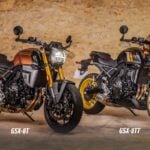
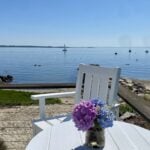
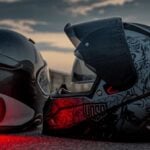
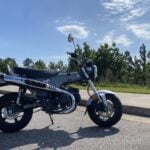
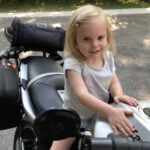


I have rode with Ted and the mild Hogs for close to 12 years. 70% of the fun on our rides is the time off bikes swapping stories and the fellowship we share. He and another hog always write up our rides and share with us. They both paint a good picture of our experiences.
It’s all about the relationships Dave. With you, our extended biker family, strangers I meet on the road and yes, even my furry friend. I can’t wait to get back on the road with you again.
Wow…..what am amazing story. This is what makes my current job, working for a motorcycle rental company, so priceless. I get to help people see what you have seen.
Thanks Tim. Also, thank you for helping to get people on motorcycles to enjoy this wonderful country of ours. Where do you live and rent bikes from?
Life is an excellent journey when we choose to experience it from the eyes and lives of others we meet along the way. Look forward to hearing more about your journey. Keep up the good work.
Thank you Jeff. Your heartfelt comments mean a lot to me. But stay tuned, more (mis)adventure stories are in the pipeline.
Thanks Jeff. Your heartfelt comments mean a lot to me. Stay tuned, more (mis)adventure stories are on the way.
I really like the article but Loosing your beloved dog brought tears to my eyes.
Dear Mike, comments like yours are why I write. I don’t write for fame, fortune or status, because I have none of those, and likely never will. We all experience highs and lows in life, and it’s all about the relationships we build with others along the way. Even if it is with a furry brown lovable lump of a dog.
Now i must quit typing. I’m tearing up again…
You’ll definitely be hearing more from Ted here on Road Dirt. We very much enjoyed this writing ourselves, and look forward to publishing more of his works in the future.
I was fortunate enough to discover Ted and his writing talents during my time at BikeBandit.com. It’s easy to see that his writing comes from a place of passion for something he loves to do. I can’t wait till I’ve got the chance to join him and the Mild Hogs on one of their adventures. The first time I read this story it hit close to home, and if you’re a dog owner you’ll understand why. I always look forward to his next story because it fuels my fire to get out and ride again.
You are mostly to blame for my success Eli. As punishment, you will be forced to ride with us on our legendary Canada tour in September where we will ride ferries, dodge cows, breakdown constantly, explore bad beer and worse cigars, sleep on beds not fit for human occupancy and abuse tires without remorse. And love every minute of it. Then, of course, comes the story.
I’m grateful my dad and myself just happened to be the first people Ted encountered when he arrived for his first trip to laguna seca. I am one of the scramp Assistant directors volunteers in the paddocks Kennel crew. People like Ted are what makes volunteering so rewarding for myself. I hope to see you this year for super bike Ted.
There is not a single moment with the SCRAMP family, or the Collier family, I would trade for anything. It’s why I ride thousands of miles and pay hundreds of dollars to camp in the dirt. But I still feel like we should apologize to the local Safeway for what we did that Wednesday night while shopping for track nachos. However, in my defense, I was left totally unsupervised and cannot be held responsible for what happened in the spice aisle.
I truly believe we all find what we’re looking for. That’s why stories like this are a great reminder that we must be intentional in choosing what to seek after. Ted, thanks for sharing. Sorry about Yogi. I know that’s hard. Keep seeking the servant souls who sacrifice and the ones who love their neighbors well. And then write it up so we can all read it and feel a little better about this place we call America.
Kevin, your positive comments reinforce what I experience on all of my journeys on a motorcycle, this country’s kind heart. If I had written all that I had experienced on that trip, from receiving water in the desert while dry camping to receiving gifts from strangers in Libby, Montana, I would have written a novel. But I had to pare it down somehow. So yes, feel good about the kindness that unites our states. It’s out there.
Thanks for sharing, a lots happened since you wrote this, but the god things are still the same. Appreciate your perspective and the ability to see things slower. Sometimes I move to fast, getting caught up in the ride and fail to see what’s right in front of me. Smell the roses they say…or the fresh cut hay, but chicken farms and road kill are also part of life. Seeking balance both in the curves and in this life we ride, thanks again. Next time you’re in North Ga or Western NC got some friends I’d like you to meet. Speak at our North Ga Mtn Riders meeting and I’ll buy your dinner, stay the night we have plenty of room.
Dear Ted (nice name by the way), after years of travels across many states, my favorite part of the ride is always the people I meet. Everything we do here at Road Dirt is about relationships, it just happens that the motorcycle is the best tool created by man for such a purpose.
And be careful what you wish for, I may be out your way this summer riding with our editor in chief Rob Brooks. It would be fun to swing by and see you guys and I would love to speak at your meeting. And I get paid in BBQ. Give me. your meeting dates and I will see what I can do.
Real men know what’s important in life. Thank you for this fine and heartfelt article.
Thank you for your kind words Mike. The right people make any motorcycle trip better whether they are ones you ride with, the ones you meet on the way or the ones you get to share your story with afterwards. Keep commenting on the articles. Road Dirt is all about relationships and we love to hear from our readers.